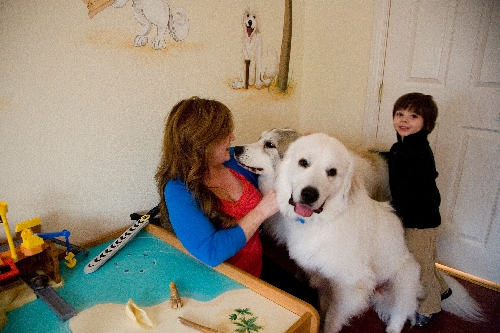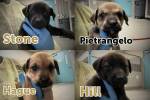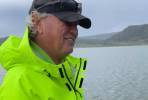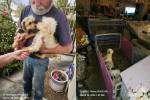Walk to raise funds for canine cancer research
In a flurry of fall festivals, harvest picnics and 5K special events, it's easy to ignore one more, but this one concerns man's best friend.
The Puppy Up! Walk will help fund cancer research for canines, which is considered "comparative oncology." According to the Center for Cancer Research, comparative oncology refers to "the inclusion of naturally occurring cancer in animals in the study of cancer biology and treatment."
In other words, find a way to save a dog's life and you might save a person's life. It is thought that the research might even "switch off" suspect genes, stopping cancer before it even forms.
"The term 'canine cancer' isn't a true term," said Rhondda Atlas, event organizer. "Cancer is cancer. It all looks the same under the microscope."
The event is slated for Nov. 3 at Bruce Trent Park, 8851 Vegas Drive, on the corner of Rampart Boulevard. Registration is set to begin at 11 a.m. and the walk at 1 p.m.
"You'd be really hard-pressed to find someone who hasn't had cancer impact their life in some way, be it a friend or family or a dog," said Cindy Spannhake, walk coordinator, who lost her mother-in-law to cancer. "Some people ... have a special spot in their hearts for their pets (because) to that one animal, you are their whole world. ... I really like the focus of this organization, not just raising money for dogs ---- we all love our pets ---- but, at some point, it's nice to extend it to the human side of things."
Atlas had never heard of Puppy Up! or the 2 Million Dogs site before June 2010. She and her husband, Rob, along with their son, Owen, then 1½, were in Massachusetts when they kept seeing a distinctive breed of dog, Great Pyrenees, on the grounds of Boston Common. Their own dogs, Ace and Twinkle, are Great Pyrenees.
The event was welcoming Luke Robinson, who had walked 2,000 miles from Texas with his Great Pyrenees dogs. Robinson started the Puppy Up! movement, and when he took the stage with his two dogs, so did Owen.
"He was on stage, calling out, 'Ace, Twinkle,' " Atlas said. "He thinks it's his dogs because he's never seen other ones before, so he runs up on stage while he (Robinson) was being interviewed. And that's kind of how we met Luke, the founder."
Back home, Atlas followed the emotional roller coaster online as one of Robinson's dogs died of cancer. Then the effort became more personal. Ace, 4, developed a tumor on his right front leg.
"Within a day or two, it became the size of a softball," she said. "I never thought it was a tumor because what tumor shows up in three days?"
His limb was amputated in June 2011. Ace was given a 50/50 chance of beating the cancer.
Ace recovered and was soon running and playing with Twinkle. The chemotherapy was tolerated well. But five months later, an X-ray of Ace's lungs showed that the cancer had metastasized.
Ace, not yet 5, stopped eating.
It was time to say goodbye. Rob Atlas carried the dog upstairs to sleep on their bed one last time.
The next day, Sept. 28, 2011, they took Ace to the vet. She held him one last time as the drugs took effect.
"He just laid in my lap, and I just petted him and waited until he just went to sleep," Rhondda Atlas said.
Her promise to Ace was she would pull together the Las Vegas walk for Puppy Up! to beat this thing.
To that end, a blood sample, taken just before Ace was put down, was sent to a research group.
"Out of 60,000 dogs (tested), he was one of seven that has helped them," Atlas said. "His risk factor was such that the scientist working on this can determine, from a litter of puppies, their risk factor for cancer. Where he (the scientist) wants to go with it is a treatment ... with a litter of puppies he can say, 'These two will more than likely have cancer,' and you can treat them ahead of time.
"Where you go with that is osteocarcinoma, what he (Ace) had, a bone cancer; it's a childhood disease. Can you imagine if you were told that your kid would have bone cancer and may have to have an amputation or this or that or may even die, but you can get this treatment now (to prevent the cancer). That's where they're going with this ... canine DNA is close enough ---- it's not like a gorilla, which is 98 percent ---- but it's close enough (to human's). If they find the cause and cure for canines, they will find it for humans. There's no doubt."
She said she plans to continue having events each year, renewing her pledge to Ace.
Robinson decided to call his foundation 2 Million Dogs because it was his vision to have 2 million dogs walking simultaneously all across the United States for cancer. For more information, to sign up for the walk or to donate, visit 2milliondogs.org.
Contact Summerlin/Summerlin South View reporter Jan Hogan at jhogan@viewnews.com or 702-387-2949.
Puppy Up! Walk
The Puppy Up! Walk is planned for Nov. 3 at Bruce Trent Park, 8851 Vegas Drive. Registration is set to begin at 11 a.m. and the walk at 1 p.m.
The event supports the 2 Million Dogs Foundation, which seeks to find the link between canine and human cancers through comparative oncology research.
For more information and to sign up for the walk or make a donation, visit 2milliondogs.org.




























